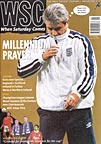 Once again the matter of abuse from fans has been brought to the media's attention, but has it ever gone away?
Once again the matter of abuse from fans has been brought to the media's attention, but has it ever gone away?
It’s no reflection on Bobby Robson’s age to suggest that perhaps his memory is failing him in certain respects. The Newcastle Utd manager was apoplectic about the treatment meted out to Alan Shearer by Watford fans at Vicarage Road in November. “Think about what he has done for club and country,” Robson entreated us. “Whatever has happened to our so-called sporting public?”
Perhaps Ipswich fans were more polite than others, but Robson cannot have been unaware that when most teams came to Vicarage Road in the Seventies and Eighties the ground reverberated to the sound of hilarious and full-throated ditties detailing the alleged sexual practices of Elton John (and even, God help us, Ross Jenkins). Whatever has happened to our so-called sporting public, it can hardly have lowered its standards since then.
Still, there is something new about the baiting of Shearer and others. It’s got to do, as usual, with the blanket coverage of the game on TV – not just the action on the pitch, but also the associated interviews, lifestyle profiles, chat shows and phone-ins.
Maybe our memory is playing tricks too, but it seems that in the pre-Sky era, fans were in some ways less discriminating about who they booed – it was more to do with physical appearance than attitude. Black players, of course, were targeted for the worst abuse. Baldies and ginger-tops could usually rely on being picked on, though to a much lesser extent. Players who didn’t run around pumping their arms like piston-engines for 90 minutes – Trevor Brooking springs to mind – were derided for being “old men” long before they really were.
By contrast, here’s a back-of-the-envelope list of some of the players who get the most abuse now: David Beckham, Alan Shearer, Roy Keane, Frank Leboeuf, David Ginola, Paul Ince, Ian Wright, Dennis Wise, Mark Bosnich.
They are not howled at just because they are good. You could make a similar list of players who are just as effective on the pitch, but rarely come under attack from opposing fans – Dwight Yorke, Gianfranco Zola, Sol Campbell, Juninho, Niall Quinn, Harry Kewell.
Most fans, obviously, do not really know what any of these players are like as people. But the amount of time they are on TV, whether on or off the pitch, makes us think that we do. The players in the first list make a habit of drawing attention to themselves, through petulance, bad grace, narkiness, perceived cheating or sheer over-exposure. The others, by and large (and it’s interesting that Yorke’s frequent appearances in the tabloids barely seem to register here) come across either as quiet and inoffensive or simply as good-natured people who enjoy what they are doing and don’t make a god-awful fuss about it. It seems likely that Trevor Brooking and Ross Jenkins would come into that category if they were still playing today.
If the targets of the fans have shifted somewhat, the nature of what is said has changed less than the recent hoo-ha might imply. Thankfully there is much less about race than there was, and probably more about sex – especially towards those players whose partners are also in the game of selling themselves through the tabloid press and the pages of Hello!
But what has happened is that television and radio are now willing to comment on whatever kind of dross is coming from the crowd. Back in the Eighties it was impossible to get even the most open-minded TV commentator to mention the fact that players were being racially vilified (John Motson still cannot admit to himself that any kind of barracking is anything other than “good-natured”, as he once described the hounding of Ruud Gullit at Wembley). Now the treatment of Shearer and Beckham, impossible to disguise thanks to the all-pervading coverage, becomes an instant issue on the Monday morning after the game.
For the fans’ part, the intense focus on each successive “controversy” has made them absurdly over-eager to drop players in it when there is any suggestion that they have been guilty of interacting with the crowd through backchat, verbal abuse, physical contact or, as in the recent case of Ian Walker, spitting. They do it because they know someone on a tabloid newsdesk will listen, but such self-righteousness sits uneasily with the torrents of abuse aimed at players every week.
Fans pay a lot of money to watch football. That doesn’t entitle them to shout or sing whatever they want at players, no matter how well paid the latter may be. On the other hand, no player is beyond criticism, as Gordon Taylor seemed to imply: “What is particularly disappointing is that someone of Shearer’s stature is not immune to it after everything he’s done for England.”
It will be a sad day when you can’t go to a football ground and call someone a grumpy sod just because they are captain of England.
From WSC 155 January 2000. What was happening this month